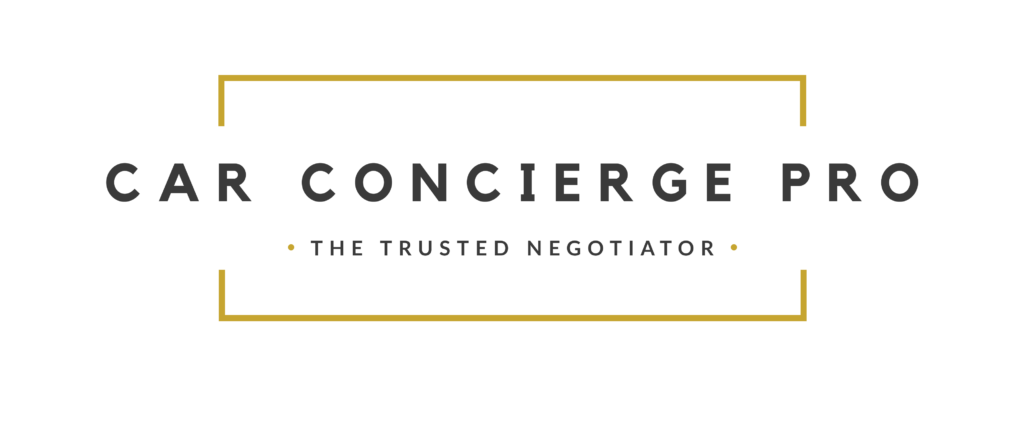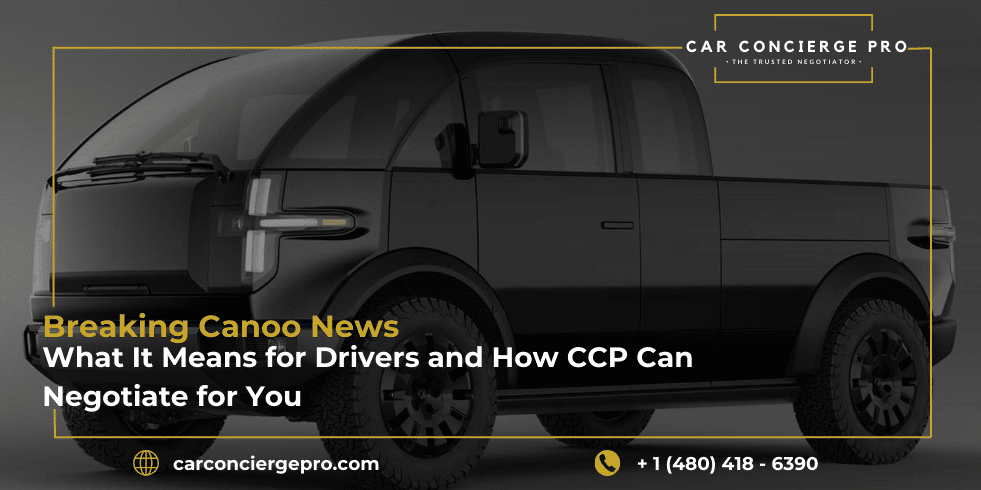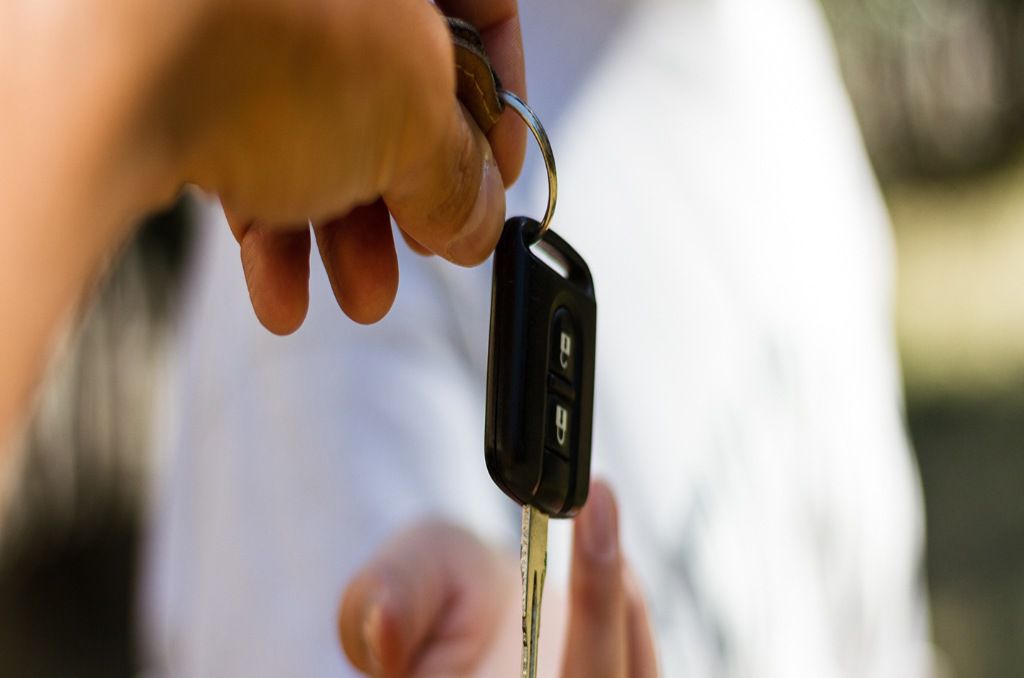If you’ve been following Canoo news recently, you know this EV startup has been making waves in the automotive and clean-energy industries. From bold partnerships with NASA and Walmart to ambitious EV models aimed at redefining urban mobility, Canoo is carving out its place in the electric vehicle landscape. For drivers, however, the buzz often comes with questions: Is a Canoo car worth buying right now? How does it compare to other EVs? And more importantly, how can you make sure you’re getting the best deal possible?
That’s where CCP (Certified Car Professionals) comes in. By blending industry expertise, insider networks, and negotiation power, CCP helps drivers cut through the noise, avoid hidden costs, and secure more favorable terms when purchasing or leasing a Canoo EV. In this article, we’ll break down the latest Canoo news, explore what makes Canoo vehicles unique, and explain how CCP can give you a distinct advantage in navigating the EV marketplace.
What sets Canoo apart from traditional automakers is its fresh perspective on electric mobility. Instead of simply electrifying existing car formats, Canoo is reimagining design from the ground up—offering futuristic, modular vehicles built for versatility, affordability, and sustainability. From lifestyle vans with spacious interiors to futuristic pickup trucks, Canoo’s approach is about more than just building cars—it’s about changing how we think of transportation in cities, businesses, and even space exploration.
Still, innovation always comes with uncertainty. Prospective Canoo EV buyers frequently express concerns about long-term reliability, access to charging networks, and the company’s ability to fulfill its ambitious commitments. These concerns make it even more important to have expert guidance, like CCP, to help evaluate the true value and practicality of owning a Canoo vehicle.
Why Canoo News Matters to Today’s Drivers
The rise of the Canoo car and EV market
Electric vehicles have moved beyond being just a choice for early adopters. Global EV adoption has surged, driven by government incentives, environmental awareness, and improvements in battery technology. Among the new players, Canoo has emerged as a company with both vision and risk.
Unlike legacy automakers transitioning into EVs, Canoo started as a pure-play electric vehicle brand. Its mission? To deliver affordable, modular, and futuristic vehicles that meet the needs of modern drivers. Canoo cars are marketed not just as vehicles but as lifestyle solutions—something that resonates with tech-savvy urban buyers.
What truly sets Canoo apart is its unconventional approach to design and ownership. From the distinctive “loft-style” interiors that maximize space to subscription-based ownership models, Canoo is reimagining what it means to drive and own a car in the 21st century. This blend of practicality and innovation positions the brand as a disruptor in the crowded EV market.
How Canoo stands apart from other electric vehicle makers
While Tesla has established itself as the premium choice and Rivian as the adventure EV, Canoo’s positioning is different. It emphasizes:
- Modular interior design adaptable for families, professionals, or fleets.
Canoo’s “loft-inspired” interiors are built with flexibility in mind. Seats, storage, and layouts can be adjusted for commuting, transporting goods, or even shared mobility services. This adaptability appeals to both personal buyers and businesses. - Subscription-based ownership models.
Instead of committing to a traditional car loan or lease, Canoo offers subscription options. This provides flexibility for drivers who don’t want long-term obligations, while also covering maintenance and insurance in a single package. - Affordable entry points compared to luxury EVs.
Canoo’s pricing strategy aims to make EVs more accessible. By focusing on functionality and modularity rather than luxury features, Canoo appeals to younger buyers, startups, and urban families who want clean mobility without a premium price tag.
This unique proposition makes Canoo news important because shifts in the company’s strategy can directly influence consumer options and pricing. With every new announcement, Canoo not only impacts potential buyers but also pressures other automakers to rethink affordability and flexibility.
Additionally, Canoo’s focus on community-driven innovation sets it apart. Instead of chasing prestige, the company aims to democratize EV ownership, making sustainable transport a realistic option for everyday people rather than a luxury reserved for the few.
What’s New in the Latest Canoo News
Updates on Canoo EV models and launches
The flagship Canoo Lifestyle Vehicle continues to be the centerpiece of the company’s lineup. Designed with futuristic aesthetics and a spacious interior, it appeals to families and businesses alike. Recent news has highlighted timelines for production ramp-ups, with deliveries aimed at fleet contracts first before scaling to individual buyers.
In addition, Canoo has been expanding its portfolio with specialized models, such as the Canoo Pickup and Delivery Vehicle (LDV). These are tailored for utility, last-mile logistics, and work-related purposes, reinforcing the company’s goal of becoming a versatile EV brand that meets both consumer and commercial demands.
Canoo partnerships, contracts, and government deals
Canoo recently secured high-profile contracts, including supplying vehicles to NASA for astronaut transport and Walmart for delivery fleets. These deals boost credibility but also raise concerns about whether individual buyers will face long waiting lists.
Beyond these marquee partnerships, Canoo has also pursued collaborations with state and federal agencies to support clean-energy initiatives. Such government-backed contracts not only provide steady revenue but also position Canoo as a trusted player in the EV space, signaling long-term stability that can reassure future customers and investors alike.
Stock market movements and what they signal
Like many EV startups, Canoo’s stock has been volatile. Investors often tie stock performance to consumer confidence. For drivers, this matters because production timelines, pricing, and service availability often depend on Canoo’s financial stability.
At the same time, stock fluctuations can also signal broader industry trends. Positive market momentum may indicate investor confidence in EV adoption and Canoo’s strategy, while downturns can reflect skepticism about profitability or competition. For potential buyers, keeping an eye on these movements provides useful context on Canoo’s ability to sustain growth and deliver on its promises.
What Makes the Canoo Car Unique
The lifestyle vehicle concept
At the heart of Canoo’s strategy is the lifestyle vehicle, a futuristic EV with a boxy yet sleek design. Its focus is on flexibility—one vehicle that can serve as a family car, work van, or rideshare shuttle.
One standout feature is the modular interior, designed to adapt seamlessly to different needs. Families can configure it for comfort and space, while businesses can optimize it for cargo or client transport, making it far more versatile than traditional EVs.
Additionally, Canoo emphasizes affordability and practicality. By targeting a broader audience instead of just luxury buyers, the lifestyle vehicle aims to make EV ownership more accessible, ensuring that innovation isn’t limited to high-end markets.
Design innovations and modularity
The Canoo car is built with modularity in mind. Owners can reconfigure the interior for personal or professional needs, making it appealing for businesses and individuals alike.
The flexible seating and storage arrangements allow for quick adaptations—from family road trips to urban delivery runs—without compromising comfort or efficiency. This versatility sets Canoo apart from traditional single-purpose vehicles.
Canoo also incorporates smart design elements, such as removable seats, configurable cargo space, and intuitive storage solutions. These features enhance usability while maintaining a futuristic, minimalist aesthetic that appeals to modern drivers.
Range, battery life, and charging infrastructure
Canoo EVs are expected to deliver competitive ranges in the 200–300-mile bracket, with charging compatibility across standard EV networks. For city drivers, this strikes a balance between cost and convenience.
Battery management systems are designed to optimize longevity, ensuring that the EV retains capacity over years of daily use. Canoo also incorporates regenerative braking technology to maximize efficiency and extend driving range in urban and stop-and-go traffic conditions.
In terms of charging infrastructure, Canoo aims to partner with both public charging networks and private fleet solutions. This dual approach allows individual drivers and commercial operators to plan routes with confidence, reducing “range anxiety” and supporting seamless adoption of EV mobility.
Pros and Cons of Owning a Canoo EV
Advantages for eco-conscious drivers
Lower emissions and carbon footprint:
Canoo EVs produce zero tailpipe emissions, helping drivers reduce their contribution to air pollution and greenhouse gases. For environmentally conscious individuals, this means actively supporting sustainable transportation while meeting city or state emission regulations. Over time, using an EV like Canoo also reduces dependence on fossil fuels, aligning with long-term environmental goals.
Unique design and brand identity:
Canoo’s futuristic, boxy-yet-sleek aesthetic sets it apart from traditional EVs. Owners not only drive a sustainable vehicle but also make a style statement, reinforcing personal or corporate identity. This distinct design appeals to tech-savvy and eco-conscious drivers who want innovation and visibility in one package.
Potentially lower upfront costs compared to Tesla or Rivian:
While luxury EVs like Tesla and Rivian have higher starting prices, Canoo aims for affordability without compromising features. This makes it an attractive option for drivers seeking sustainable transportation while managing their budget. Lower entry costs can also enable faster adoption, especially for urban commuters and fleet operators.
Cost, availability, and maintenance challenges
Canoo is still ramping production; availability is limited:
As a relatively new EV startup, Canoo is gradually scaling its manufacturing. This means prospective buyers may face long waiting periods for delivery, particularly for specific trims or configurations. Limited production also increases competition among buyers, which could affect pricing or availability for individual customers.
Maintenance networks are not as widespread as established brands:
Unlike Tesla or traditional automakers, Canoo’s service infrastructure is still developing. Drivers may need to travel farther for repairs or specialized EV maintenance. Limited service centers can create delays for warranty claims or routine servicing, which is an important consideration for urban and fleet users.
Costs of ownership may increase due to insurance and EV-specific servicing:
Specialized EV parts and expertise can make repairs or maintenance more expensive than conventional vehicles. Insurance premiums may also be higher because Canoo cars are new, technologically advanced, and still uncommon on roads. Prospective owners should budget for these ongoing costs to maintain a realistic total cost of ownership.
Comparing Canoo with Tesla, Rivian, and Lucid
Tesla offers established reliability; Rivian delivers off-road strength; Lucid focuses on luxury. Canoo competes by offering affordability and modular design, but it lacks the infrastructure that older brands enjoy.
How CCP Helps Drivers Negotiate Canoo Deals
Leveraging insider networks for pricing
CCP works with dealerships, manufacturers, and fleet sellers to identify real pricing opportunities. While Canoo vehicles may have limited distribution channels, CCP often secures early-buyer incentives or fleet-level discounts.
Their industry connections allow clients to access pre-announcement offers and special configurations not widely advertised. By monitoring production schedules and dealer allocations, CCP ensures buyers can act quickly when favorable pricing emerges, reducing the risk of paying a premium due to scarcity or hype. This approach also helps anticipate potential cost fluctuations tied to market demand or production delays, giving buyers a strategic advantage.
Identifying hidden costs in EV ownership
Beyond the sticker price, EV owners must account for charging installations, higher insurance premiums, and battery warranty limitations. CCP lays out these hidden costs in advance, ensuring buyers don’t face financial surprises.
Other considerations include maintenance of specialized components, potential software updates, and costs associated with out-of-network servicing. By evaluating these factors upfront, CCP helps buyers develop a realistic total cost of ownership, allowing for better budgeting and comparison with other EV options.
This proactive approach reduces unexpected expenses and provides peace of mind for both first-time EV buyers and seasoned enthusiasts.
Customization and service add-ons negotiation
Canoo’s modular designs and subscription add-ons can inflate costs. CCP negotiates bundled service terms, warranty extensions, and reduced pricing on optional features. By leveraging insider knowledge, CCP identifies which upgrades add real value and which can be deferred or obtained at a discount. They also ensure that any add-ons, from interior customization to software packages, are transparently priced and aligned with the buyer’s needs. This approach minimizes overspending while allowing buyers to enjoy tailored features without compromising their budget. In addition, CCP tracks promotional offers and manufacturer incentives, often unlocking savings that aren’t publicly advertised.
Financing and Leasing Options for Canoo Vehicles
Flexible ownership models
Canoo initially floated the idea of a subscription-only model but later adapted to include leasing and financing. Buyers today can explore flexible paths that balance affordability and long-term ownership.
This flexibility lets drivers select a plan that fits their lifestyle—whether a short-term subscription, a mid-term lease with manageable payments, or traditional financing leading to full ownership.It ensures that Canoo EVs are accessible to a wider audience without compromising on features or convenience.
CCP’s role in securing better terms
From lower interest rates to lease structures with mileage flexibility, CCP ensures clients aren’t locked into unfavorable agreements. Their expertise helps drivers align financing terms with their actual driving needs.
By analyzing each client’s usage patterns and financial goals, CCP can recommend tailored solutions that minimize costs while maximizing value. This proactive approach prevents surprises and ensures a smoother, more predictable ownership experience.
Pitfalls to Avoid When Buying a Canoo Car
Overlooking the total cost of ownership
The upfront purchase is just one part of the equation. EV charging setup, insurance, and depreciation must be considered. Failing to account for these factors can turn a seemingly affordable Canoo EV into a costly investment over time.
CCP helps buyers calculate the full lifecycle expenses, including maintenance, subscription services, and potential battery replacements, ensuring a realistic picture of long-term ownership costs.
Ignoring warranty and service coverage
Canoo’s service network is still growing. Buyers should confirm warranty terms and service availability before committing. Limited service locations and evolving support infrastructure can lead to delays or higher costs for repairs and maintenance. Understanding the specifics of warranty coverage, including battery and drivetrain protection, is crucial. CCP guides buyers through these details, ensuring they choose a Canoo EV with adequate support for peace of mind.
Rushing into stock-linked hype
Many buyers equate stock surges with vehicle quality. While financial health matters, personal driving needs should remain the core factor. Reacting impulsively to media buzz or investor sentiment can lead to overpaying or long wait times. CCP helps clients focus on practical considerations such as availability, total cost, and suitability for daily use. By separating stock market noise from real-world purchasing decisions, buyers can make informed, confident choices.
size=3 width=”100%” align=center>
Practical Tips for Prospective Canoo Owners
How to evaluate long-term value
Think about resale value, charging infrastructure in your city, and brand stability before finalizing. Consider potential software updates, battery longevity, and future model iterations that could affect desirability. CCP provides insights into market trends and ownership forecasts to help gauge which Canoo models are likely to retain value. Factoring in these elements ensures your purchase is not only satisfying today but also a smart decision for the years ahead.
Smart ways to budget for an EV
Set aside 10–15% beyond the purchase price for charging setup, insurance, and unexpected service needs. Factor in potential subscription fees or optional add-ons that Canoo may offer. CCP can help create a detailed cost plan to prevent surprises and keep your EV ownership financially smooth.
Checking charging station access before purchase
Evaluate apps like PlugShare or ChargePoint to ensure your area has robust EV infrastructure. Consider the distance to fast-charging stations and whether home charging is feasible. Reliable access reduces range anxiety and ensures convenient daily use. CCP can also advise on optimal locations and potential installation support for home chargers.
Mini-Summary: Canoo News and CCP’s Value
Canoo represents one of the boldest EV startups today, aiming to blend affordability, modular design, and futuristic styling. For drivers, however, Canoo news often brings both excitement and uncertainty—limited availability, hidden costs, and evolving models. CCP helps cut through this complexity by negotiating better deals, highlighting hidden expenses, and securing favorable financing options.
By leveraging insider networks, market insights, and personalized guidance, CCP empowers buyers to make confident, well-informed decisions. Whether it’s evaluating long-term value, understanding service coverage, or accessing exclusive offers, their expertise ensures that drivers get the most out of their Canoo EV purchase without overpaying or facing unexpected challenges.
Conclusion: Should You Buy a Canoo Car Now?
For eco-conscious drivers seeking a unique EV with a future-ready design, Canoo presents an exciting option. However, the risks of limited availability, growing infrastructure, and fluctuating costs remain. The best approach is to pair Canoo’s innovation with CCP’s negotiation expertise. Together, they ensure you’re not just buying into hype but securing a deal that makes long-term financial sense.
FAQs
- What’s the latest Canoo news for drivers?
Recent Canoo news highlights updates on EV launches, partnerships with NASA and Walmart, and production ramp-ups, all of which affect availability for individual buyers. Staying informed on these developments helps drivers plan purchases and anticipate delivery timelines. - Is the Canoo car available for personal buyers now?
Yes, but availability is limited as Canoo prioritizes fleet contracts. Individual deliveries are expected to scale gradually, so early engagement with CCP can help secure a vehicle sooner. - How does the Canoo EV compare with Tesla and Rivian?
Canoo EVs focus on modular design and affordability, while Tesla emphasizes premium tech and Rivian highlights adventure utility. Canoo also offers unique subscription and flexible ownership models that differentiate it from competitors. - Can CCP really negotiate a lower price on a Canoo car?
Yes. CCP leverages insider networks, identifies hidden costs, and secures better financing or lease terms, making ownership more cost-effective. Their expertise ensures buyers avoid overpaying and gain additional benefits such as optional add-ons or service packages. - What financing options exist for Canoo cars?
Buyers can explore leasing, financing, or subscription models. CCP helps negotiate the most favorable terms, aligning payment plans with individual driving needs and long-term affordability. - What are the hidden costs of owning a Canoo EV?
Charging installations, higher insurance, and limited service availability are common hidden expenses. Factoring in these costs early ensures a realistic understanding of total ownership expenses. - Is it worth investing in a Canoo vehicle right now?
If you value modular design and eco-friendly driving, Canoo is worth considering—but pairing your purchase with CCP’s negotiation support ensures smarter ownership. Their guidance minimizes risks and maximizes both financial and practical benefits of EV ownership.





